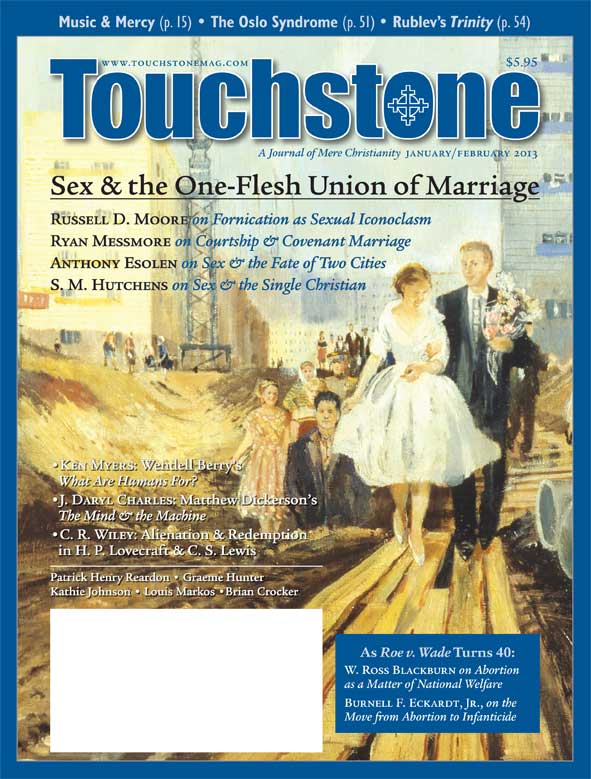Sexual Iconoclasm
Russell D. Moore on Christian Honesty About the Harm of Fornication
So David, did you do any fornicating this weekend?" This line, attributed to Richard Nixon, is fixed in American presidential lore as the former president's inquiry to talk-show host David Frost before their famous post-Watergate interview. The question is memorable because the word "fornicating" carries all the same connotations that many associate with Nixon himself. It seems awkward, out-of-date, censorious, and kind of Inquisitorial.
Therein is a parable. The word "fornication" is almost never used these days except among those who want to ridicule backward, Puritan sexual norms of the most Hawthornian sort. The word is sometimes used to ridicule Christian sexual counter-revolutionaries as prissy prigs who talk like a late 1980s Saturday Night Live version of the "Church Lady." Or, come to think of it, like Richard Nixon trying, and failing, to be one of the boys.
Losing More than a Word
But that's just it. The joke doesn't really work because Christians don't talk like that, in public or in private, at least not any more. And they haven't for a long time. "Fornication" sounds as creepy and out-of-place to a Christian's ears as it does to anyone else's. Sure, we talk about sexual morality and warn against sexual immorality, but those are the words we use, on our best days. More commonly, we teach our children and our single church members to "practice abstinence" or to avoid "premarital sex."
But could it be that the loss of the words "fornicate" and "fornication" is about something more than just updating our vocabulary to connect with the society around us? Could it be that we've lost something crucial about the grammar of the Christian faith? Moreover, could it be that, by using the language of "premarital sex," we've implicitly ceded the moral imagination to the sexual revolutionaries?
Language is important. Think of the difference it makes whether your child's elementary-school teacher refers to Washington and Adams and Jefferson as "founding fathers" or as "insurrectionists," or, conversely, of Osama Bin Laden as a "terrorist" or a "revolutionary." The words "chastity" and "abstinence" simply aren't univocal terms, and the words "fornication" and "premarital sex" aren't interchangeable.

In the term "premarital sex," the emphasis is on timing. The act itself is the same; the "sex" is unaltered linguistically. What changes "marital sex" to "premarital sex" is simply when one chooses to engage in it. This assumption, though, is right at the heart of the contemporary American Christian crisis of sexual ethics.
My own denomination, the Southern Baptists, maintains a consensus, with the rest of the Church in its Catholic, Orthodox, and historical Protestant forms, that sexual activity is biblically limited to the marriage union. My denomination has commendably sought to shore up this ethic with good denominational programs encouraging teenagers and young adults in our Southern Baptist churches to maintain this moral standard. While studies show that such initiatives have some effectiveness in at least delaying sexual intercourse among young singles, it is not at all clear that Southern Baptists and other Evangelicals have succeeded in creating a sexual counterculture.
Sexual Risk Management
In his book Forbidden Fruit: Sex and Religion in the Lives of American Teenagers (Oxford University Press), sociologist Mark Regnerus shows that abstinence-pledge programs are most effective with younger adolescents, and that the "appeal of the pledge diminish[es] as the sex drive increases with age." Regnerus demonstrates that Evangelical Protestant teenagers are more likely to engage in sex while unmarried than their Mormon, Jewish, and even mainline liberal Protestant peers.
Regnerus also demolishes the common notion that these virginity pledges are the driving force in what many of us have seen anecdotally for years—namely, Evangelical teenagers clinging to a "technical virginity" through sexual practices other than intercourse. Regnerus acknowledges that the "technical virginity" charade happens, but he says it has nothing to do with seeking to avoid some kind of religious guilt. It's instead a "future-oriented, self-focused (but not anti-family), risk-aversive, parent-driven (and subtly class-oriented)" middle-class morality.
To put it bluntly, teenagers of whatever religious persuasion in contemporary America are more likely to delay intercourse and to substitute oral sex or some other form of gratification for intercourse because they are trying to avoid risks to their future economic well-being. They are "technical virgins" because they want to go to college rather than because they want not to go to hell. As conservative Evangelicals grow more socially and economically ascendant, Regnerus predicts, they will be more likely to adopt the same forms of sexually tolerant risk management focused on economic viability.
This brings us back to language. The talk of "abstinence" and "waiting" shores up the implicit risk management behind the cultural milieu. It is not just in our public witness that we adopt the culture's grammar; we do so in our own churches and parishes. How often do we urge teenagers to maintain chastity to be consistent with their "values" and to avoid bad consequences to their health, their future marriages, or their walk with God? These consequences are no doubt real, but why would it seem so awkward to say what the Scripture says quite straightforwardly—that fornicators will not inherit the kingdom of God (1 Cor. 6:9–10)?
One does not have to be some sort of wild-eyed "hellfire and brimstone" revival preacher to recognize that the apostles and prophets seem insistent that sexual immorality brings upon itself the wrath of God (Rev. 21:8). Yet this sounds so foreign, even to our ears, that we retreat instead to terms like "struggling" and "need for accountability" and even "addiction."
A Form of Blasphemy
Fornication, quite simply, isn't merely "premarital sex." It isn't only a matter of impatience. It is not simply the marital act misfired at the wrong time, a kind of, as it were, premature ejaculation. Yes, it is true that the sexual act in fornication is, or at least can be, the same sort of physical activity as wedded sexuality. And it's true that, in fornication, the couple involved may be doing that which they would be qualified to do if they were a married couple (which would distinguish fornication from, say, sodomy or incest). But fornication is, both spiritually and typologically, a different sort of act from the marital act, and is indeed a parody of it.
Sexual union is not an arbitrary expression of the will of God (much less of random Darwinian processes). It is instead an icon of God's purposes for the universe in the gospel of Christ. Paul's classic text on the one-flesh union of marriage from Ephesians 5 makes no sense if it is presented as it is too often preached: as a set of tips for a healthier, "hotter" marriage. Instead, this passage is part of an ongoing argument about the cosmic mystery of Christ, a mystery "which was not made known to the sons of men in other generations as it has now been revealed to his holy apostles and prophets by the Spirit" (Eph. 3:5).
The Genesis 2 mandate to leave father and mother, to cleave to one another, and to become one flesh is a "mystery" and "refers to Christ and the Church" (Eph. 5:31–32). The husband/wife union is a visible representation of the Christ/Church union—a covenantal bond in which, as a head with a body, Jesus is inseparable from his bride, a bride he protects, provides for, leads, disciples, and sanctifies. He is as inseparable from his Body as a human head is from a human body—a truth the apostle heard from the voice of the Galilean himself, when Jesus asked the persecutor of the Church on the Road to Damascus, "Why are you persecuting me?" (Acts 9:4).
Fornication pictures a different reality than that of the mystery of Christ. It represents instead a Christ who uses the Church without joining her, covenantally, to himself. It is not just "naughtiness." To use another word Christians find awkward and antiquated, it's blasphemy.
This is why the consequences for fornication in Scripture are so severe. The man who leads a woman into sexual union without a covenantal bond is preaching to her, to the world, and to himself a different gospel. He is forming a real spiritual union, the apostle warns, but one that is of a different spirit than the sanctifying Spirit of God in Christ (1 Cor. 6:15–19).
An Act of Infidelity
And here, again, is where our language betrays us. We still haven't, for the most part, lost the language of "adultery." While someone might speak of "an affair," rarely does one speak of "extramarital sex"—except for the sociologists and sex therapists. The spouse cheated on is more likely to use a word filled with the gravity of "adultery." And it is quite easy for couples to see the ongoing consequences—even in marriages that stay together—of adulterous infidelity.
Unfortunately, though, the language of "premarital sex" brings with it the illicit assumption that the problem is resolved once the timing is brought in line with the activity. After all, if the sex was "premarital" and now one is married, it would seem that the event in question is all in the past. My colleague S. M. Hutchens notes the wrongheadedness of such a view, ignoring as it does the real and abiding attachments made by illicit sexuality (see "Interlocking Hearts," p. 19).
Moreover, couples fail to see the power of the spiritual warfare they're up against if they see the "premarital sex" as something in the past. Fornication is, itself, an act of infidelity. In the act of fornication, I am sinning against a future or a potential spouse because I am indulging my desires apart from the self-giving of covenant union.
Understanding the Root Problem
Adultery can be forgiven by the gospel of the shed blood of Jesus Christ. So can fornication or any other sin (except, of course, as our Lord teaches us, blasphemy against the Holy Spirit, but that's another story). But because we've so domesticated fornication, it seems to me that adultery is in some ways easier to repent of, because it's easier to know what repentance looks like.
A man who has committed adultery, if he is repentant, understands something of how he has broken trust, attacked a covenant. He is able, then, to see that, even when his wife has forgiven him, he must invest years in rebuilding that trust, in showing what John the Baptist calls "fruits in keeping with repentance" (Luke 3:8). He is able to understand why his wife cannot wholly surrender herself to him as easily as she could before. After all, if he'll cheat with one woman, why wouldn't he cheat with another? He's an adulterer, and he must show himself to be faithful.
With "premarital sex," on the other hand, marriage seems to have fixed the problem. But the fornicator now married, unlike the repentant adulterer now caught, often doesn't see the ongoing nature of his problem. Often he finds it difficult to lead his wife spiritually, or to fully gain her trust. Sometimes this shows up immediately; sometimes years later. The root problem is the same. She knows that they have sinned. And, as Alice von Hildebrand says, reflecting on the shame of the primeval couple in the account of the Fall in Genesis 3: "Nothing drives a couple further apart than sinning together."
Moreover, she knows, especially if he professed to be a Christian before the marriage, that his libido is stronger than his conscience. If he's able to justify his fornication, he will justify his adultery. They are not two separate things. They are two different assaults on the same thing: the uniting and self-giving covenant of marriage.
Shame & Liberation
I am not suggesting that we totally ban the language of "premarital sex" or "abstinence," especially when we're trying to explain a Christian ethic to the outside world using categories already in play. I am suggesting, though, that part of what it means to recover a Christian vision of sexuality is to recover a lexicon worthy of the gravity of human sexuality. We don't simply wish to say, "Wait more patiently." True love waits, yes, but, more importantly, true love mates.
In order to recover the beauty and the exuberance of marital unity, we need to speak honestly and bluntly of the ugliness of its counterfeits. We learn, then, not to be ashamed of the Christian language of "fornication," but instead to be ashamed of fornication itself.
This shouldn't make us more censorious. Instead, when we speak honestly, we are able, paradoxically, to speak with more liberating power to sinners—including sexual sinners—in our streets and sidewalks and pews. The same gospel that tells us that fornicators will not inherit the kingdom of God also tells us, "And such were some of you. But you were washed, you were sanctified, you were justified in the name of the Lord Jesus Christ and by the Spirit of our God" (1 Cor. 6:11). •
Russell D. Moore is president of the Ethics and Religious Liberty Commission of the Southern Baptist Convention. He is a senior editor of Touchstone.
subscription options
Order
Print/Online Subscription

Get six issues (one year) of Touchstone PLUS full online access including pdf downloads for only $39.95. That's only $3.34 per month!
Order
Online Only
Subscription

Get a one-year full-access subscription to the Touchstone online archives for only $19.95. That's only $1.66 per month!
bulk subscriptions
Order Touchstone subscriptions in bulk and save $10 per sub! Each subscription includes 6 issues of Touchstone plus full online access to touchstonemag.com—including archives, videos, and pdf downloads of recent issues for only $29.95 each! Great for churches or study groups.
Transactions will be processed on a secure server.
more on sex from the online archives

28.2—March/April 2015
Man, Woman & the Mystery of Christ
An Evangelical Protestant Perspective by Russell D. Moore
more from the online archives
calling all readers
Please Donate
"There are magazines worth reading but few worth saving . . . Touchstone is just such a magazine."
—Alice von Hildebrand
"Here we do not concede one square millimeter of territory to falsehood, folly, contemporary sentimentality, or fashion. We speak the truth, and let God be our judge. . . . Touchstone is the one committedly Christian conservative journal."
—Anthony Esolen, Touchstone senior editor











